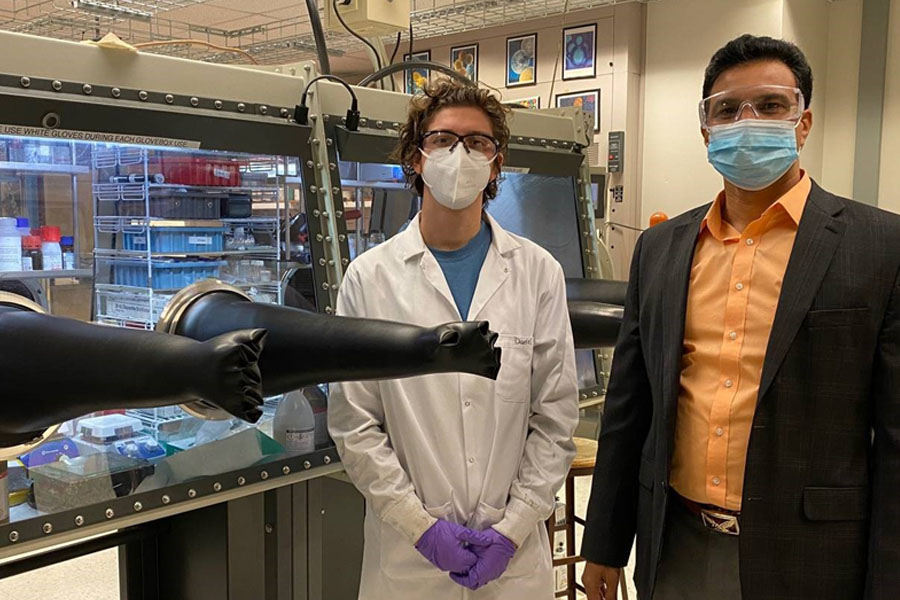Pol receives DoD award to test Li-ion batteries at extreme temperatures
Vilas Pol, Professor of Chemical Engineering in the Davidson School of Chemical Engineering, was one of three Purdue Engineering researchers awarded a grant from the Department of Defense's (DoD) Defense University Research Instrumentation Program (DURIP). These grants will be provided to 81 institutions across 35 states in Fiscal Year (FY) 2022.

Pol’s project is titled "Li-ion Battery Safety Systems: In situ/Multi-mode Calorimetry, Electrochemical Impedance Spectroscopy, and Critical Temperature Cycling".
Lithium-ion (Li-ion) batteries are rechargeable batteries commonly used in electronic devices such as mobile phones, laptops and tablets. Since high temperatures lead to catastrophic failure and possible fire of these batteries and low temperatures hinder their ability to charge and discharge, battery operation is confined to a relatively small temperature window. DURIP is providing new equipment that will enable Pol's lab to perform in-situ tests to evaluate thermal safety at high temperatures and to check state-of-health of novel batteries developed in his laboratory that could perform at extremely low temperatures.
"We will have high throughput to test electrolyte conductivity, charge transfer impedances and capacity retention, and to obtain an in-depth mechanistic understanding of factors which impact battery performance at extreme temperatures," Pol said.
"We can perform in-situ thermal safety analysis of batteries including all critical components such as the electrodes, separator and electrolyte with a unique calorimeter, which is not possible using conventional devices, enabling a more holistic understanding of their thermal safety and aiding in identifying thermal runaway mechanisms," said Daniel Gribble, a chemical engineering PhD student in Pol’s laboratory.
Pol joined the Davidson School of Chemical Engineering in 2014, where he leads the Vilas Pol Energy Research Group (ViPER), an experimental group dedicated to fulfill the knowledge gap required to advance energy storage technologies. "To improve thermal safety of energy-dense lithium-ion batteries has always been the unique focus of the ViPER Lab," he explained. "However, following excellent results of a tailored high-energy density lithium sulfur battery at subzero temperature in 2018 and its promising applications in navy and defense, we have expanded our interests in developing low temperature electrolytes for Li-ion batteries."
Over the next five years Pol hopes to develop a battery chemistry that is safe at elevated temperatures and also retains reasonable capacity in even the coldest environments (below -100 Celsius). He wants to then use this technology to produce practical "pouch cells" - lighter, easily-shaped batteries that could be used in defense, arctic and space exploration applications.
"The Davidson School of Chemical Engineering is pleased that the DoD recognizes via this DURIP award the leading work of Professor Vilas Pol in the area of energy storage research,” said Dr. Sangtae Kim, the Jay and Cynthia Ihlenfeld Head of the Davidson School of Chemical Engineering and Distinguished Professor, Purdue University.
Through DURIP, DoD supports purchases of major research equipment to augment current and develop new capabilities. This effort enables universities to perform state-of-the-art research that boosts the United States’ technological edge, while ensuring that our future science, technology, engineering, and mathematics (STEM) workforce remains second to none. This year, the awards will support equipment and instrumentation to accelerate basic research. The program is administered through a merit competition jointly by the Air Force Office of Scientific Research, Army Research Office, and Office of Naval Research.
“DURIP awards provide essential research infrastructure to enable the pursuit of new knowledge and help maintain cutting-edge capabilities of our universities,” said Dr. Bindu Nair, Director, Basic Research Office, Office of the Undersecretary of Defense for Research and Engineering.
